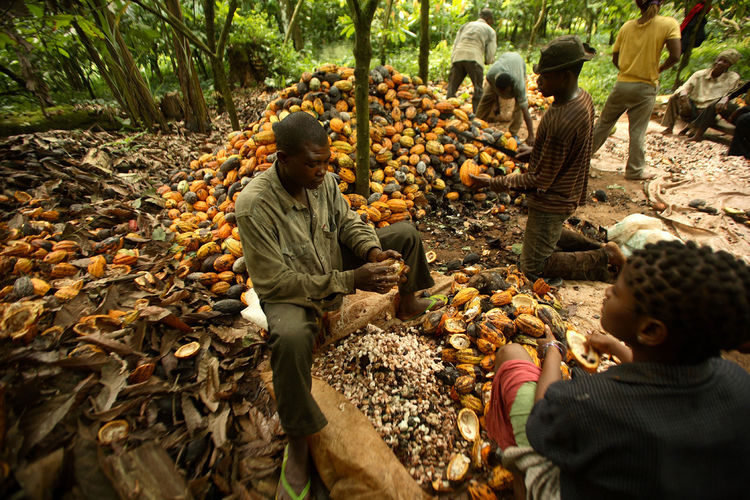Nigeria has dropped to the seventh position from fourth as a top cocoa producer in the world, according to data made available by the International Cocoa Organisation.
The President, Cocoa Association of Nigeria, Mr. Sayina Riman, said the review of the rankings was made by the ICO based on the country’s 2015/2016 production projection of 190,000 metric tonnes.
“Nigeria has fallen from four to seven. It is shocking to us. The ranking was announced to us at a meeting that our 2015/2016 production figure leaves us at 190,000 metric tonnes,” he said.
According to the ICCO statistics, Nigeria occupied the fourth position in the 2013/2014 season based on its estimated production output of 230,000 metric tonnes after Côte d’Ivoire, Ghana and Indonesia.
Riman, who said that the 2015/2016 season yielded about 275,000 metric tonnes for the country, expressed optimism that the new planting season would yield between 280,000 metric tonnes and 300,000 metric tonnes provided that the production factors were favourable.
The output of 275,000 metric tonnes fetched the country about $792m in that period based on the ICCO daily price of $2,878.55 per tonne of cocoa beans on September 15, 2016.
This shows that cocoa production rose by 17 per cent from 235,000 metric tonnes in the 2014/2015 planting season to 275,000 metric tonnes in the 2015/2016 season.
The production of individual countries, according to the ICCO, is based on cocoa beans purchased or reaching the ports of the countries concerned and consequently, may differ from the harvested crop.
Riman, however, explained that many exporters were avoiding the ports and were smuggling cocoa beans out of the country, because they were discouraged by the earnings from the commodity, which had been restricted to N305 to $1 adopted as the interbank rate.
According to him, it is not profitable for exporters because the export business is done with loans at 29 per interest rate.
He explained, “Last year, the drought adversely affected our cocoa output and secondly, the monetary policy affected us. We have the limitations of not having free access to our proceeds as they come and some cocoa beans are now being smuggled to other countries so that exporters can have their proceeds there.
“What the CBN is doing, which is not acceptable to the export commodity sector, is that they still want us to change the export proceeds at the interbank rate. The parallel market rate is N420 to the dollar, while the interbank rate is N320.
“Who takes the N100 difference? We understand the system perfectly well that some people may be round-tripping the money. We are borrowing money at 29 per cent interest rate and you are still asking people, without providing any form of incentive, to bring their money and sell at the interbank rate. This is affecting the commodity sector.”
The CAN president stressed, “It is a boost to the economy if they allow us unfettered access to our proceeds. During former President Olusegun Obasanjo’s regime, we found out that our export proceeds through the agricultural sector were about $770m but that was shared because of the monetary policy of the CBN then. We went to the President and they gave us unfettered access. And when that was done, incentives were also added. The proceeds rose from $770m to $12bn.”
Nigeria’s cocoa performance in the global market in the past years had been hampered by dry weather, scanty rainfall as well as old and worn trees.
The Federal Government, during the last administration, targeted a yearly increase that would raise production to around 700,000 metric tonnes in 2016 and one million metric tonnes by 2020.
As such, farmers were provided with early-maturing, high-yielding and disease-resistant beans that mature in about 18 months to replace seedlings with four to five years’ maturity rate.
“We have distributed more than 140 million seedlings of high-yielding cocoa varieties to recapitalise the cocoa plantations, because they are old. That will give us a yield of almost five times. By 2020, Nigeria should be certainly in the one million metric tonnes cocoa production club,” the immediate past Minister of Agriculture and Rural Development, Dr. Akinwumi Adesina, had said in 2014.
The Chief Executive Officer, Nigerian Export Promotion Council, Mr. Segun Awolowo, last year said that a drop in cocoa production would adversely affect the target to increase yield.
“We need to scale up production; the idea is to surpass Ivory Coast and Ghana. Ghana is already at 700,000 metric tonnes, and we are still hovering around 240,000 metric tonnes, but the idea was to get to 500,000 metric tonnes in the next few years,” he said.


 Billionaire Watch3 weeks ago
Billionaire Watch3 weeks ago
 Startups4 weeks ago
Startups4 weeks ago
 News4 weeks ago
News4 weeks ago
 News4 weeks ago
News4 weeks ago
 Bitcoin4 weeks ago
Bitcoin4 weeks ago
 Naira4 weeks ago
Naira4 weeks ago
 Forex3 weeks ago
Forex3 weeks ago
 Treasury Bills4 weeks ago
Treasury Bills4 weeks ago
























